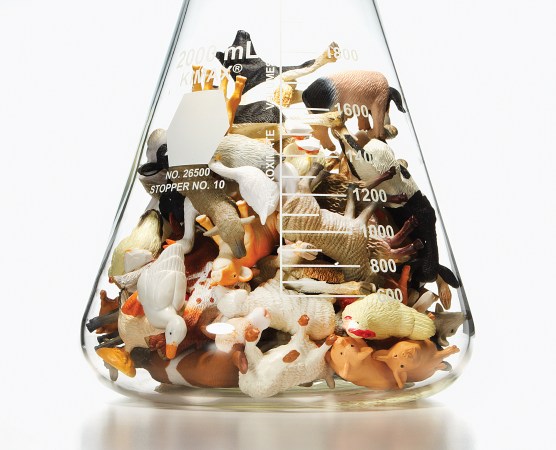

Analysis paralysis—being so overwhelmed by options you can’t pick a path—has new meaning thanks to climate change. Making the “right” choice has never been more complicated, but we’re here to help. This is Impact, a new sustainability series from PopSci.
Many products often come with expiration dates to indicate a predetermined shelf life, like food and medicine. Once the indicated date has passed, these products are generally deemed unfit for use or consumption—but does that mean people should toss them out the second that date passes?
According to the U.S. Environmental Protection Agency, the average person generated about 2.68 pounds of municipal solid waste per day in the 1960s, which include food, plastic, and paper waste. This amount increased to 4.74 pounds in the 2000s, finally reaching 4.9 pounds in 2018. The disposal of expired but usable or consumable goods can contribute to overall waste. By minimizing this, an individual may be able to reduce the amount of waste they produce.
Here’s what expiration dates generally mean for various products and when consumers can safely overlook them.
Expired food may still be safe to consume
For most products, the date on the packaging label is not an expiration date, but a ‘best by’ or ‘sell by’ date, says Londa Nwadike, extension associate professor of food safety at the Kansas State University and the University of Missouri. “In general, the dates on the food—other than infant formula and baby food—are set for quality, rather than safety purposes,” she adds.
Although expired food may not be at its peak deliciousness, it should still be safe to consume. There’s no hard and fast rule, and it’s more important to pay attention to how long since the food was bought and whether it was kept in proper conditions, says Nwadike. If a product is discolored, moldy, abnormally soft, or it generally looks and/or smells bad, throw it out immediately—no matter how carefully it was stored.
[Related: How to go zero-waste at the grocery store.]
To optimize quality and shelf life and avoid food waste, proper storage is crucial, says Nwadike. Perishable foods should be kept in the refrigerator or the freezer to avoid spoilage. Foods that do not require refrigeration for safety have lower risk and they can generally be consumed safely longer, she adds. For instance, dry pasta can still be eaten one year after opening it if it was stored in the pantry.
To check how long various foods remain consumable, people can download the FoodKeeper mobile application developed by USDA’s Food Safety and Inspection Service (FSIS). Anyone can browse foods by category or search for food products to know how long foods can be consumed, depending on how and when it was stored.
Medications past their expiration date aren’t worth the risk
The expiration date of a drug refers to the last day that the manufacturer can guarantee its safety, effectiveness, and stability for use.
“It is recommended you avoid using medications past their expiration date,” says Anneliesa Henslee, the associate director of specialty retail pharmacy at The Ohio State University Wexner Medical Center. “There may be less benefit from taking an expired medication, so symptom control may not occur and conditions for which the medications are prescribed may worsen.”
Some medications also break down into harmful compounds past their expiration date, which could lead to unintended side effects if ingested, says Henslee. The use of expired oral antibiotic tetracycline, which is typically prescribed for bacterial infections, was linked to a kidney disorder called Fanconi syndrome. Symptoms like nausea and vomiting were reported two to eight days after taking the expired drug. In general, taking expired antibiotics that are only sub-potent can lead to antibiotic resistance. Moreover, certain expired medications, like liquid suspensions, may be at risk of bacterial growth.
Although some drug products remain stable at least one year after their expiration, the additional stability period is highly variable. To be on the safe side, get rid of expired medications altogether.
Individuals can drop off expired medications at drug drop boxes located at local police departments or pharmacies, says Henslee. The U.S. Drug Enforcement Administration (DEA) also holds a National Prescription Drug Take Back Day twice a year to provide consumers with a convenient way to dispose of unwanted pharmaceuticals. The most recent Take Back Day last October gathered 372 tons of medication, and the next one will be held on April 30. People can enter their zip code or location in the Collection Site Locator to see nearby collection sites.
Proceed with caution when it comes to irritating beauty products
No U.S. laws or regulations currently require cosmetics to have specific expiration dates or shelf lives on their packaging. The expiration date recommendations on the packaging of beauty and personal care products are generally conservative and account for the different ways people use them, says Elisabeth Anderson, director of science communication in the Center for Research on Ingredient Safety at Michigan State University.
“You should discontinue using any product that causes irritation,” says Anderson. “You can use your best judgment on these products as you know how it was stored, used, and how your skin reacts.” Using an expired foundation, lotion, or powder might not necessarily be harmful, however, you may notice a decline in the product quality with how it lies on the skin, which may cause redness or irritation, she adds.
[Related: Are ‘clean’ cosmetics better for us than other beauty products?]
The authors of a 2019 study published in the Journal of Applied Microbiology analyzed more than 450 used beauty products that people had donated, including lipsticks, eyeliners, and mascaras. They found that 70 to 90 percent of the samples were contaminated with bacteria like Staphylococcus aureus and Escherichia coli, and beauty blenders contained the highest amount. If you feel adamant about using expired products, it’s probably best to use brand new makeup applicators like sponges or brushes.
“The only product we feel strongly about discarding immediately upon expiration is mascaras and liquid eyeliners—essentially any product that’s liquid and can get into your eyes easily,” says Anderson, who was not involved in the study. “Eye infections may require more intensive medical treatment, and it’s simply not worth the risk.” It’s recommended that people dispose of mascara two to four months after purchase because of the exposure to bacteria and fungi every time it is applied.
At this time, there’s no recommended way to safely upcycle or repurpose expired beauty products, therefore consumers should only purchase what they can use in a reasonable time frame, she adds.
Always replace expired disinfectant products
Cleaning products that are designed to remove superficial dirt will often be able to dissolve and remove dirt even when they’re expired, says Anderson. Products like tile and carpet cleaners or multi-purpose cleaning sprays may not clean as effectively when they’re expired, but they’re unlikely to be harmful and you can use them until they are gone, she adds.
However, disinfectants are a completely different product altogether. They are designed—and registered with the U.S. Environmental Protection Agency (EPA)—to destroy harmful pathogens upon contact with the active ingredients that they contain, says Anderson. Disinfectants have a shelf life of about one year, and it’s not advisable to use them past the indicated expiration date.
“Potency [of the chemical agents] slowly declines over time,” she adds. “It’s best to dispose of the expired product properly and use a fresh product rather than not properly disinfecting an area, especially if someone has an active, contagious infection that you’re trying to control the spread of.”
Ultimately, checking the expiration date of different products is crucial, but it’s equally important for consumers to know when to follow or disregard it to minimize avoidable waste.















